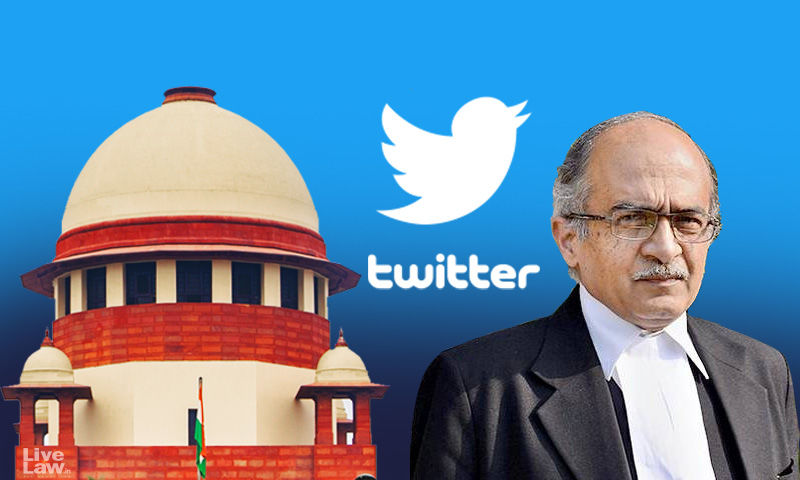Prashant Bhushan contempt case: SC set to pronounce sentence on Monday
 NEW DELHI : A bench headed by Justice Arun Mishra will pronounce its verdict on the quantum of sentence to be awarded to activist-lawyer Prashant Bhushan, convicted for contempt of court over his two tweets against the judiciary and Chief Justice of India SA Bobde.
NEW DELHI : A bench headed by Justice Arun Mishra will pronounce its verdict on the quantum of sentence to be awarded to activist-lawyer Prashant Bhushan, convicted for contempt of court over his two tweets against the judiciary and Chief Justice of India SA Bobde.
A bench headed by Justice Arun Mishra will pronounce its verdict against Bhushan, who faces simple imprisonment of up to six months or with a fine of up to Rs 2,000 or with both as punishment under Contempt of Court Act.
Mr Bhushan in the last hearing on Tuesday refused to apologise for his tweets, though the government’s top lawyer who is assisting the court had suggested he should be pardoned with a warning.
On August 25, the top court was urged by senior advocate Rajeev Dhavan to show “judicial statesmanship” and not make Bhushan a “martyr” by punishing him for contempt over his tweets criticising the judiciary, after the activist-lawyer rejected fresh suggestions from the court for an apology.
As the top court reserved its verdict on the sentence to be awarded to Bhushan, Justice Arun Mishra, who presided over a three-judge bench, at the fag end of the nearly three-hour-long hearing had asked why he cannot seek an apology and what was wrong in using this word. Justice Mishra is demitting office on September 2.
After a back-and-forth in the courtroom and an emotional statement by outgoing judge Justice Arun Mishra, the Supreme Court had reserved its judgment.
“If you are hurting someone, then what is wrong in apologising?” Justice Arun Mishra had said. “For how long the system will suffer all this? I am retiring in a few days. Will it be okay if you or others start attacking me? You should apply balm if you have caused hurt,” he had said.
Justice Mishra was responding to arguments by Mr Bhushan’s lawyer Rajeev Dhavan and Attorney General KK Venugopal.
Prashant Bhushan, held guilty of contempt, refused to retract or apologise for his tweets after the court’s three-day window ended on Monday. In a 100-page statement, he said the tweets represented a bonafide belief that he holds and an apology, conditional or unconditional, would be insincere. Retracting now would be a “contempt of my conscience” and the court, he said.
The Supreme Court had sought an unconditional apology and had asked the 63-year-old to “reconsider” his statement. On Tuesday, the court told Mr Bhushan to consider withdrawing the statement.
On August 25, the top court was urged by senior advocate Rajeev Dhavan to show “judicial statesmanship” and not make Bhushan a “martyr” by punishing him for contempt over his tweets criticising the judiciary, after the activist-lawyer rejected fresh suggestions from the court for an apology.
As the top court reserved its verdict on the sentence to be awarded to Bhushan, Justice Arun Mishra, who presided over a three-judge bench, at the fag end of the nearly three-hour-long hearing had asked why he cannot seek an apology and what was wrong in using this word.
The apex court on August 14 had held Bhushan guilty of criminal contempt for his two derogatory tweets against the judiciary saying they cannot be said to be a fair criticism of the functioning of the judiciary made in the public interest.
On August 25, Dhavan, representing Bhushan, had suggested that the top court recall the August 14 verdict convicting him for contempt of court and not impose any sentence and urged it to not only close the case but also to bring an end to the controversy. Attorney General K K Venugopal requested the court to forgive Bhushan with a message that he should not repeat this act.
The bench also comprising Justices B R Gavai and Krishna Murari, had given 30 minutes to Bhushan to “think over” on withdrawing his statements made in the court and said he made “disparaging remarks against the institution and the judges”.
Venugopal had said Bhushan, who has been refusing to tender an unconditional apology for the tweets, should withdraw all statements and express regret. The bench on August 20 had granted time till Monday to Bhushan to reconsider his “defiant statement” and tender “unconditional apology” for the contemptuous tweets.
Referring to Bhushan’s statements and his refusal to apologise, the bench had told Venugopal that mistakes were committed by all but they needed to be accepted, but here Bhushan was not willing to accept that.
Dhavan had argued that reprimanding Bhushan like “don’t do it again” as suggested by the attorney general will not be correct and instead a statesman-like message should be there like “Mr Bhushan though we disagree with many things, but from next time you should be more responsible”.
Bhushan in his statement had refused to offer an apology to the Supreme Court for his two tweets against the judiciary, saying what he expressed represented his bona fide belief which he continued to hold.
(With Agency Inputs ).

